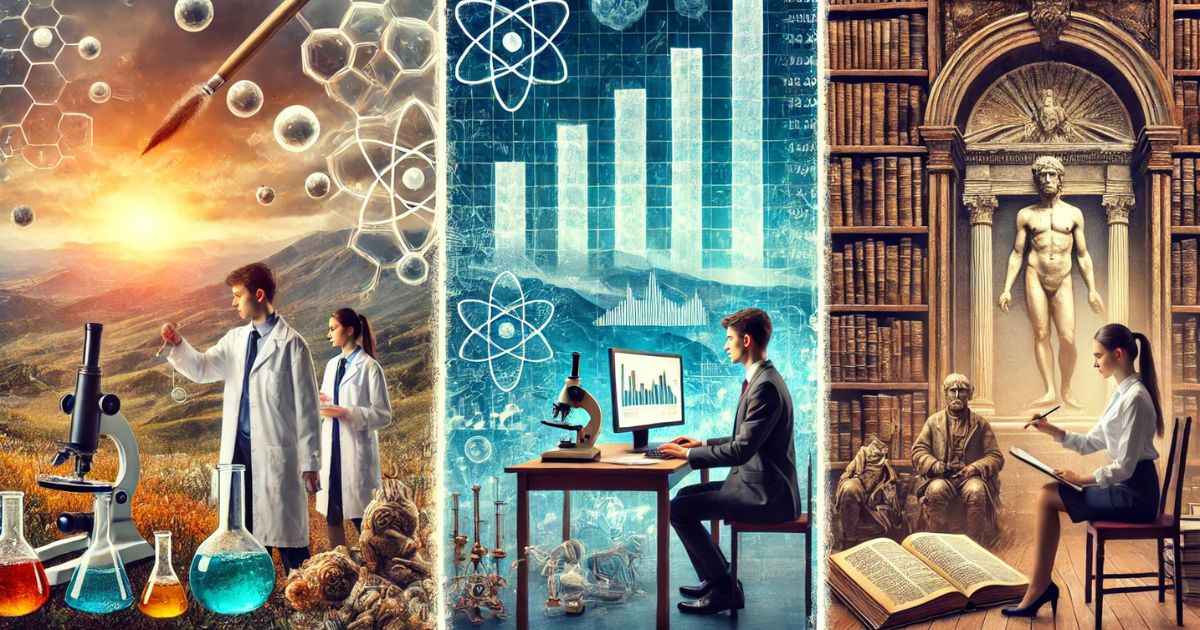
Becoming a scientist, economist, or historian is a journey that requires education, curiosity, and hard work. Each profession focuses on understanding the world from different perspectives—science explores nature and technology, economics studies how resources are used, and history examines the past. In this guide, we will explain in simple steps how you can become any of these three professionals.
1. How Can One Become a Scientist?
Step 1: Develop an Interest in Science
- Start by being curious about how things work in nature, technology, health, or the universe.
- Read science books, watch documentaries, and ask questions about the world around you.
Step 2: Focus on Science Subjects in School
- Study subjects like physics, chemistry, biology, and mathematics.
- These subjects build the foundation for all scientific careers.
Step 3: Get a College Degree in Science
- Choose a field of science that interests you: biology, physics, chemistry, environmental science, etc.
- Complete a Bachelor’s degree (B.Sc.) in your chosen field.
Step 4: Pursue Higher Education (Optional but Important)
- To do advanced research, get a Master’s degree (M.Sc.) or Ph.D..
- This allows you to specialize in a specific area and conduct experiments or studies.
Step 5: Work in Research or Industry
- Join research institutes, laboratories, or industries that hire scientists.
- You can work in healthcare, technology companies, universities, or government organizations.
Qualities Needed to Be a Scientist
- Curiosity and problem-solving skills
- Patience for experiments and research
- Attention to detail
2. How Can One Become an Economist?
Step 1: Develop an Interest in How Economies Work
- Learn about how people make decisions, how businesses operate, and how money moves in the economy.
- Follow the news related to markets, finance, and economic issues.
Step 2: Study Economics and Math in School
- Focus on mathematics, economics, and social studies in school.
- Economics often involves understanding data and statistics.
Step 3: Get a College Degree in Economics
- Complete a Bachelor’s degree (B.A. or B.Sc.) in Economics.
- Learn about microeconomics, macroeconomics, statistics, and economic theories.
Step 4: Specialize with a Master’s Degree or Ph.D. (Optional but Helpful)
- A Master’s (M.A. or M.Sc. in Economics) helps you gain deeper knowledge.
- A Ph.D. in Economics allows you to teach at universities or conduct advanced research.
Step 5: Work as an Economist
- Economists work in government departments, banks, financial institutions, international organizations (like the World Bank or IMF), and universities.
- Some work as policy advisors, data analysts, or financial consultants.
Qualities Needed to Be an Economist
- Strong analytical and mathematical skills
- Critical thinking and problem-solving ability
- Interest in current affairs and global issues
3. How Can One Become a Historian?
Step 1: Develop a Love for History
- Read about past civilizations, important events, famous leaders, and cultures.
- Visit museums, watch historical documentaries, and explore old monuments if you can.
Step 2: Study History and Related Subjects in School
- Focus on history, geography, political science, and literature.
- Learn how to read and understand historical documents.
Step 3: Get a College Degree in History
- Complete a Bachelor’s degree (B.A. in History).
- Study different periods of history, from ancient to modern times.
Step 4: Specialize with a Master’s or Ph.D. (Optional but Valuable)
- Get a Master’s degree (M.A. in History) if you want to become a historian.
- A Ph.D. in History lets you become a university professor or a professional researcher.
Step 5: Work as a Historian
- Historians work in universities, museums, archives, and research institutions.
- Some historians write books, work on archaeological projects, or create documentaries.
Qualities Needed to Be a Historian
- Passion for reading and research
- Attention to detail and critical thinking
- Good writing and communication skills
Similar Steps for All Three Careers
- Education:
A good education is the first step. All three professions require college degrees and often further study. - Research Skills:
Whether you study nature, the economy, or the past, you need research skills. Learning how to gather and analyze information is key. - Writing and Communication:
Scientists, economists, and historians write reports, papers, and books. They also present their work at conferences or to the public. - Curiosity and Dedication:
All three careers need people who are curious, dedicated, and passionate about learning and discovery.
Conclusion
To become a scientist, economist, or historian, you need education, curiosity, and commitment.
- A scientist explores nature and technology through experiments and research.
- An economist studies how money, markets, and resources work and help shape policies.
- A historian investigates and explains the past, helping us understand how the world has changed.
Each career has its own path, but they all share a love of learning and discovery. Choose what excites you the most, study hard, and take the steps to make it your career!
Also Check:
• How Can One Become a Scientist
• How, in Your Opinion, Can Mukesh Realise His Dream?



